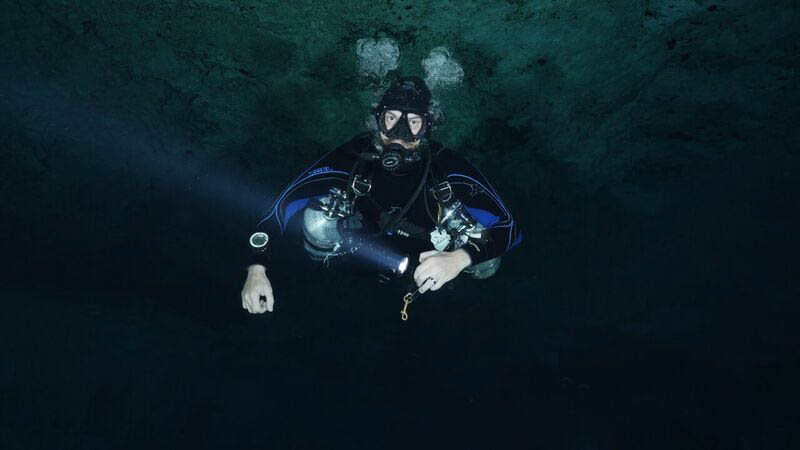It should be no surprise that scuba enthusiast Erik Rosenstein is committed to protecting the environment. He has bachelor’s degrees in environmental science and biochemistry, as well as advanced post-graduate degrees in environmental toxicology and environmental law. Plus he has spent a lot of time underwater, as evidenced by his impressive diving credentials: TDI Full Cave Instructor, TDI Intro to Tech Instructor, TDI Advanced Nitrox Instructor, TDI Sidemount Instructor and PADI Master Scuba Diver Trainer.
As an instructor and owner of Beyond Diving in Playa del Carmen, Mexico, environmental responsibility is part of his message. “I really enjoy diving and I enjoy transmitting the passion I feel about the underwater world to others. I also feel that it is a very good way of educating people about environmental issues that are affecting our planet and raising awareness. Also, when I teach children and young people, I like to think that they will be more aware of their actions and they will try to minimize their impact on the world.”
Asked what issue he would he target in a campaign to raise awareness on a problem that affects divers, oceans or marine life, Rosenstein replies: “There are so many issues that are currently affecting the ocean. Overfishing, pollution, global warming, coral bleaching, invasive species, erosion, over-development . . . We are trying to raise awareness with local restaurants as well as with our customers about stopping the use of plastic straws. Plastic straws are used for less than 20 minutes on average, are single use, they are made of polypropylene or polystyrene and take thousands of years to break down. They get washed out to the ocean where fish, turtles, mammals and birds can and will eat them and die from it. There are so many alternatives, like, for example, not using one. If you must use straws, there are paper straws that are biodegradable.”
Rosenstein, 39, made his first dive in 1990 in Cancun while on vacation with his parents and earned his Open Water certification in 1993, also in Cancun. He was trained by National Geographic Explorer Guillermo de Anda, who owned a dive shop in Cancun then. His dream dive buddy would be de Anda. Erik would love to join him on one of his exploration projects, or even just for a fun dive. “He’s always been a big hero of mine. I am very glad that throughout the years we’ve kept in touch, although we never seem to be able to connect to go diving.
“Since I was a small child I was fascinated by the ocean and by scuba diving. When people would ask me what I wanted to be when I grew up, I would always reply that I was going to be a diver. I had all kinds of scuba related toys, videos, books . . . It didn’t matter to me. If it had pictures of people diving, reefs, shipwrecks or submarines, I was fascinated by it. Then, when I finally had the opportunity to start diving, I never wanted to stop.”
Asked about his favourite dive sites, Erik says in the ocean locally at Playa del Carmen, he likes Tortugas Reef. “I love seeing turtles hanging out and doing their thing. Then we have the caves.
I love cave diving. One of my favourite caves is Xunaan-Ha. It is a beautiful cave — lots of formations, some tight restrictions, just lovely.”
His first cave dive stands out as his most memorable. “Just being in a cave, in total darkness with nothing but my primary light (and that of my buddy) to light up the place was an experience unlike any other. The water was so clear, the formations so beautiful, so peaceful, yet so deadly to the untrained.”
Rosenstein’s “bucket list” of dream dive sites includes Orda Cave in Russia. “From pictures and videos this cave looks amazing. Plus it is under the Ural Mountains, so that makes it cooler.” Truk Lagoon and Bikini Atoll are also on his list because of their many shipwrecks. His favourite piece of diving equipment is his home-made side-mount rig. “My knees love it too.”
It was Erik’s passion for cave diving that prompted his move to Playa del Carmen. “Since Playa, as we locals affectionately call it, is right in cave country it seemed like the perfect place to call home. Plus, there are so many diving opportunities other than just caves. We have some fantastic reefs right off the coast. Cozumel is a short boat ride away. We can do recreational, technical, shallow, deep, stupid deep, see all kinds of marine life and have a lazy drift dive. It is indeed a great diving destination . . . Over the last four years since my wife and I opened our dive centre we have been growing, yet still kept our operation as a small family-run dive centre.
“It’s great that I get to go out most days with our guests and do fun dives, do training dives, run courses, be it a discover scuba class or a full cave course and I am not stuck just managing a big shop with dozens (or hundreds) of divers every day . . . I’d like to think our guests are happier, our students better trained, and that makes us happy.”
While Erik’s passion for environmentalism was no surprise, his choice as a marine life form to come back as in his next life was surprising. “A great white shark . . . I spent many years studying them for scientific research. They are mysterious and have a bad reputation, but they are not the killers that man has made them out to be. They mind their own business, do their thing and keep everything in check. I can relate to them.”
Erik Rosenstein is a “transplanted” Canadian, now living in Mexico and is the owner/dive instructor of Beyond Diving in Playa del Carmen, Mexico





